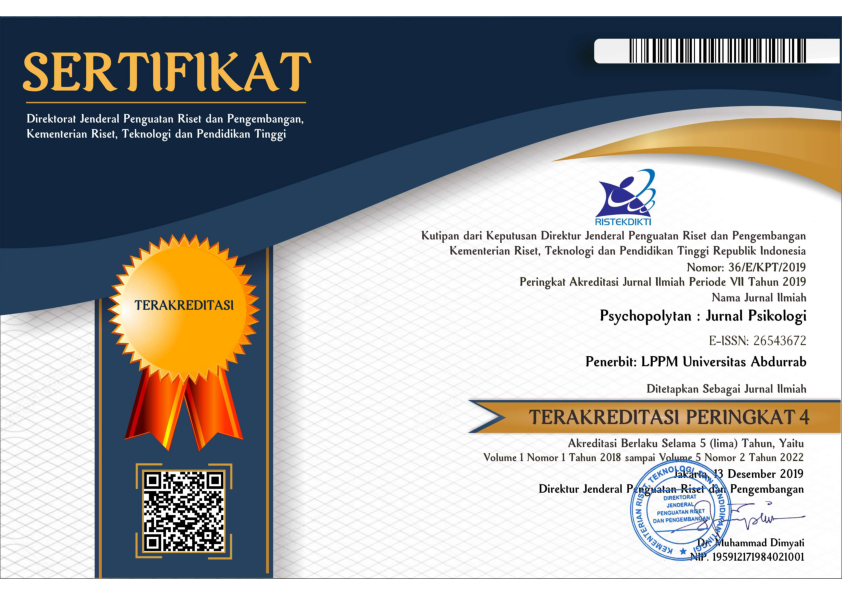Motivasi Bermain Game dan Mediasi Orangtua dengan Kecenderungan Adiksi Video Game pada Anak
Abstract
Adiksi video game menjadi perhatian para peneliti di dunia, ditandai munculnya adiksi video game dalam DSM 5 sebagai internet gaming disorder. Namun kebanyakan penelitian tersebut masih berfokus pada remaja meski saat ini, mayoritas anak-anak juga sudah bermain video game dengan berbagai tingkatan motivasi yang melatarbelakanginya. Orangtua sebagai pihak yang memfasilitasi anak dengan perangkat untuk bermain game perlu memediasi interaksi anak dengan game yang dimainkannya. Penelitian ini bertujuan untuk mengetahui hubungan antara motivasi bermain video game dan mediasi orangtua terhadap kecenderungan adiksi video game. Penelitian ini melibatkan 233 anak berusia 9-12 tahun (110 laki-laki ; 123 perempuan).. Analisis jalur yang dilakukan menunjukkan bahwa mediasi gatekeeping menjadi moderator hubungan antara motivasi bermain dengan kecenderungan adiksi video game.
References
American Psychiatric Association. (2013). Diagnostic and statistical manual of mental disorders (5th ed.). Washington DC: American Psychiatric Association.
Baler, R. D., & Volkow, N. D. (2006). Drug addiction: the neurobiology of disrupted self-control. Trends in Molecular Medicine, 12(12), 559–566. https://doi.org/10.1016/j.molmed.2006.10.005
Benrazavi, R., Teimouri, M., & Griffiths, M. D. (2015). Utility of Parental Mediation Model on Youth’s Problematic Online Gaming. International Journal of Mental Health and Addiction, 13(6), 712–727. https://doi.org/10.1007/s11469-015-9561-2
Boot, W. R., Kramer, A. F., Simons, D. J., Fabiani, M., & Gratton, G. (2008). The effects of video game playing on attention, memory, and executive control. Acta Psychologica, 129(3), 387–398. https://doi.org/10.1016/j.actpsy.2008.09.005
Chou, C., & Tsai, M. J. (2007). Gender differences in Taiwan high school students’ computer game playing. Computers in Human Behavior, 23(1), 812–824. https://doi.org/10.1016/j.chb.2004.11.011
D. Griffiths, M., J. Kuss, D., & L. King, D. (2012). Video Game Addiction: Past, Present and Future. Current Psychiatry Reviews, 8(4), 308–318. https://doi.org/10.2174/157340012803520414
Dewi, P. A. (2018). Peran adiksi video game terhadap agresivitas yang dimoderatori oleh persepsi terhadap mediasi orang tua pada masa anak-anak akhir di Daerah Istimewa Yogyakarta. Universitas Gadjah Mada.
Diamond, A. (2013). Executive functions. Annual Reviews of Psychology, (64), 135–168. https://doi.org/10.1146/annurev-psych-113011-143750
DiClemente, C. . (2003). Addiction and Change: How Addictions Develop and Addicted People Recover. New York: Guilford Press.
Green, C. S., & Bavelier, D. (2012). Learning, attentional control, and action video games. Current Biology, 22(6), R197–R206. https://doi.org/10.1016/j.cub.2012.02.012
Griffiths, M. D. (2010). The role of context in online gaming excess and addiction: Some case study evidence. International Journal of Mental Health and Addiction, 8(1), 119–125. https://doi.org/10.1007/s11469-009-9229-x
Hellström, C., Nilsson, K. W., Leppert, J., & Slund, C. (2012). Influences of motives to play and time spent gaming on the negative consequences of adolescent online computer gaming. Computers in Human Behavior, 28(4), 1379–1387. https://doi.org/10.1016/j.chb.2012.02.023
Horzum, M. B., & Bektas, M. (2014). Examining the internet use aim and internet parental style of primary school students in terms of various variables. Croatian Journal of Education, 16(3), 745–778.
Jiow, H. J. (2014). Parental mediation of video gaming in Singapore (Doctoral Thesis). National University of Singapore, Singapore.
Jiow, H. J., Lim, S. S., & Lin, J. (2017). Level Up! Refreshing Parental Mediation Theory for Our Digital Media Landscape. Communication Theory, 27(3), 309–328. https://doi.org/10.1111/comt.12109
Lemmens, J. S., Valkenburg, P. M., & Gentile, D. A. (2015). The internet gaming disorder scale. Psychological Assessment, 27(2), 567–582. https://doi.org/10.1037/pas0000062
Lemmens, J. S., Valkenburg, P. M., & Peter, J. (2009). Development and validation of a game addiction scale for adolescents. Media Psychology, 12(1), 77–95. https://doi.org/10.1080/15213260802669458
Pratchett, R. (2005). Gamers in the UK: Digital play, digital lifestyles. BBC. Retrieved from https://crystaltips.typepad.com/wonderland/files/bbc_uk_games_research_2005.pdf
Santrock, J. . (2011). Life-span Development (11th ed.). New York: McGraw-Hill.
Shaffer, D. . (2009). Social and Personality Development (6th ed.). Belmont: Wadsworth.
Sublette, V. A., & Mullan, B. (2012). Consequences of Play: A Systematic Review of the Effects of Online Gaming. International Journal of Mental Health and Addiction, 10(1), 3–23. https://doi.org/10.1007/s11469-010-9304-3
Unantenne, N. (2014). Mobile Device Usage Among Young Kids: A Southeast Asia Study. Asianparent Insights Mobile. The Asian Parent Insight. Retrieved from https://s3-ap-southeast-1.amazonaws.com/tap-sg-media/theAsianparent+Insights+Device+Usage+A+Southeast+Asia+Study+November+2014.pdf
Yee, N. (2006). Motivations for play in online games. Cyberpsychology and Behavior, 9(6), 772–775. https://doi.org/10.1089/cpb.2006.9.772
1. Copyright of all journal manuscripts is held by the Psychopolytan : Jurnal Psikologi
2. Formal legal provisions to access digital articles of electronic journal are subject to the provision of the Creative Commons Attribution-ShareAlike license (CC BY-NC-SA), which means that Psychopolytan : Jurnal Psikologi is rightful to keep, transfer media/format, manage in the form of databases, maintain, and publish articles.
3. Published manuscripts both printed and electronic are open access for educational, research, and library purposes. Additionally, the editorial board is not responsible for any violations of copyright law.
licensed under a Creative Commons Attribution-ShareAlike 4.0 International License.
 pdf
pdf
 Abstract views: 762
Abstract views: 762
 downloads: 658
downloads: 658

 :
:








